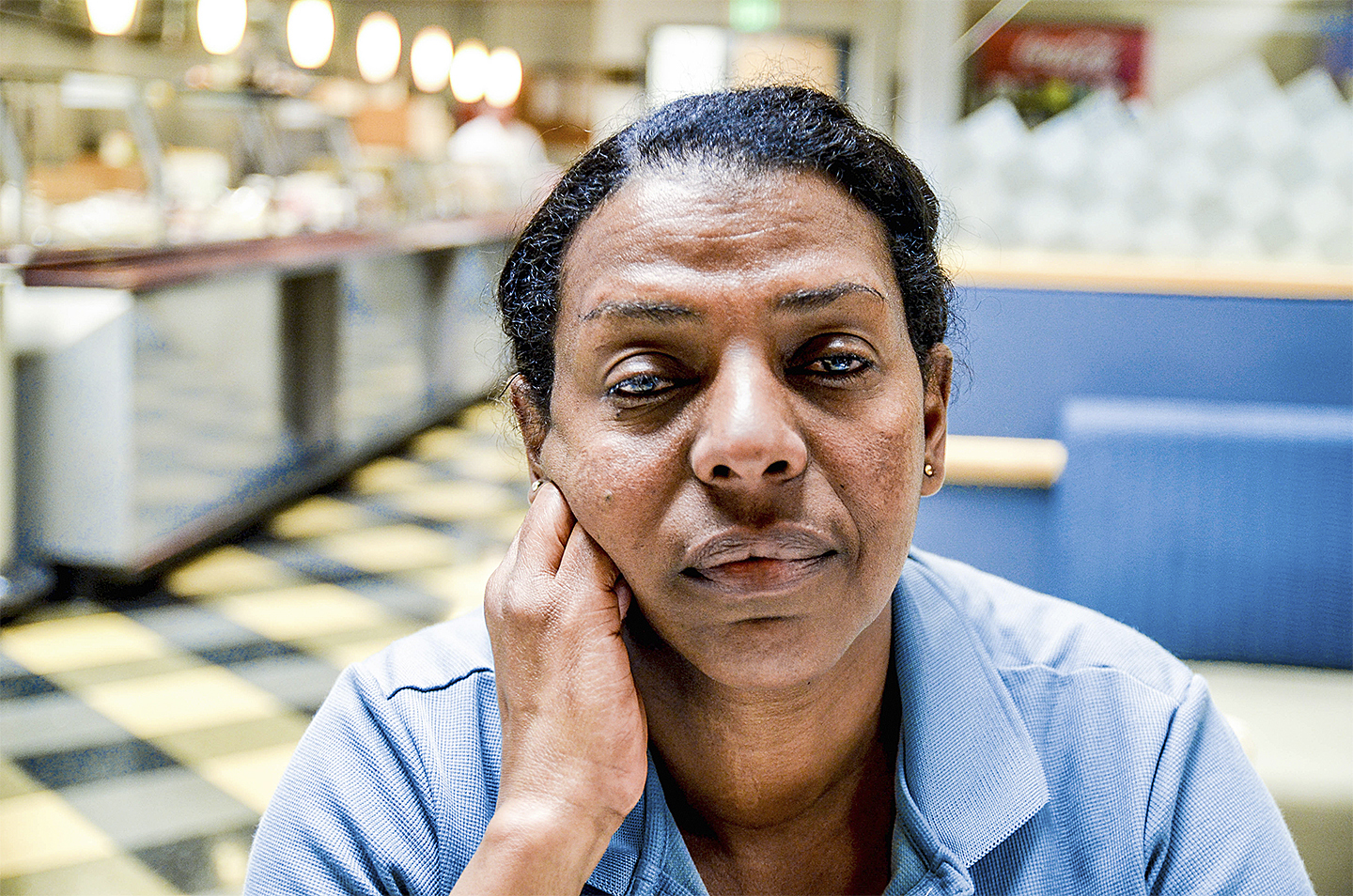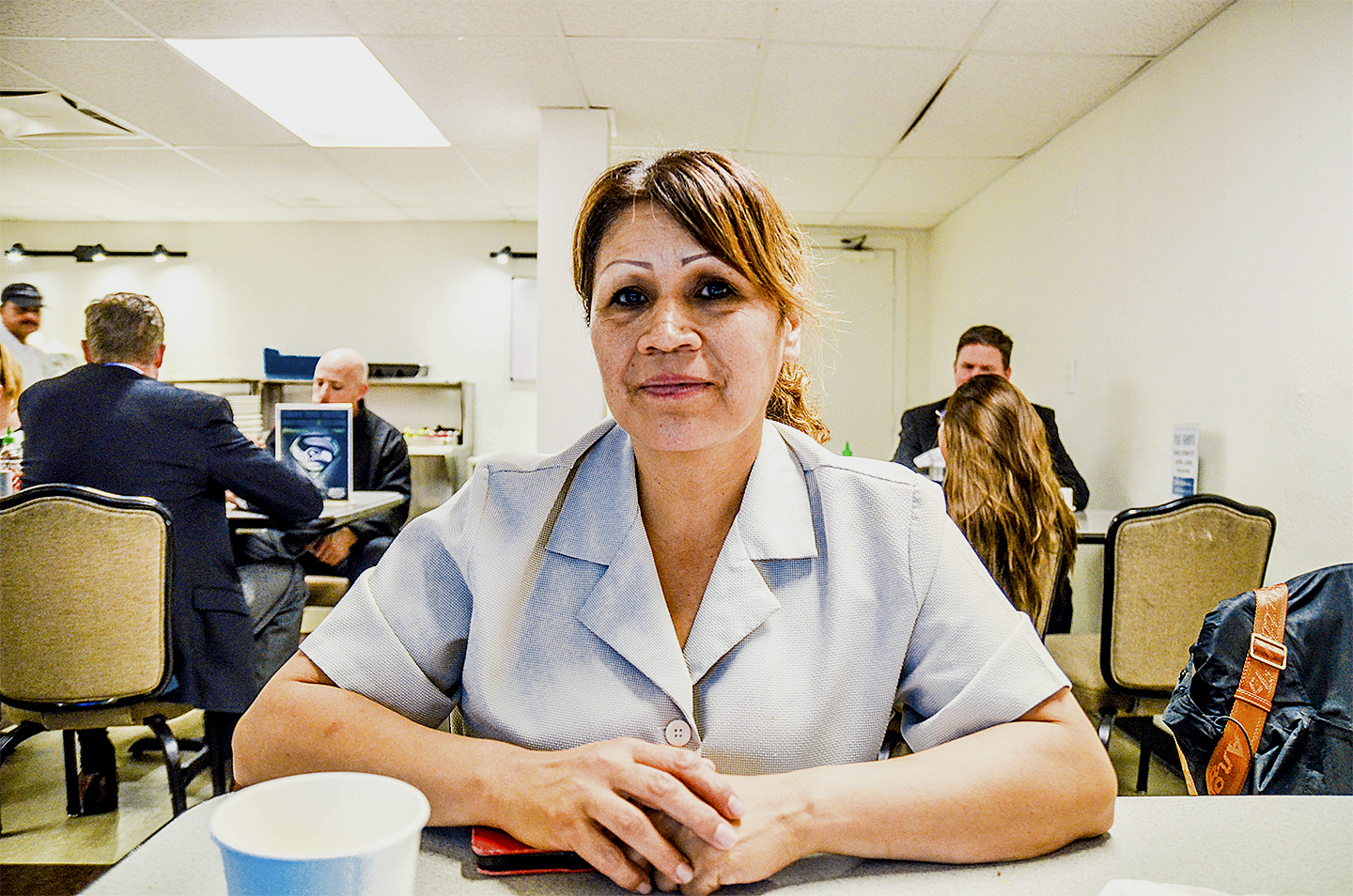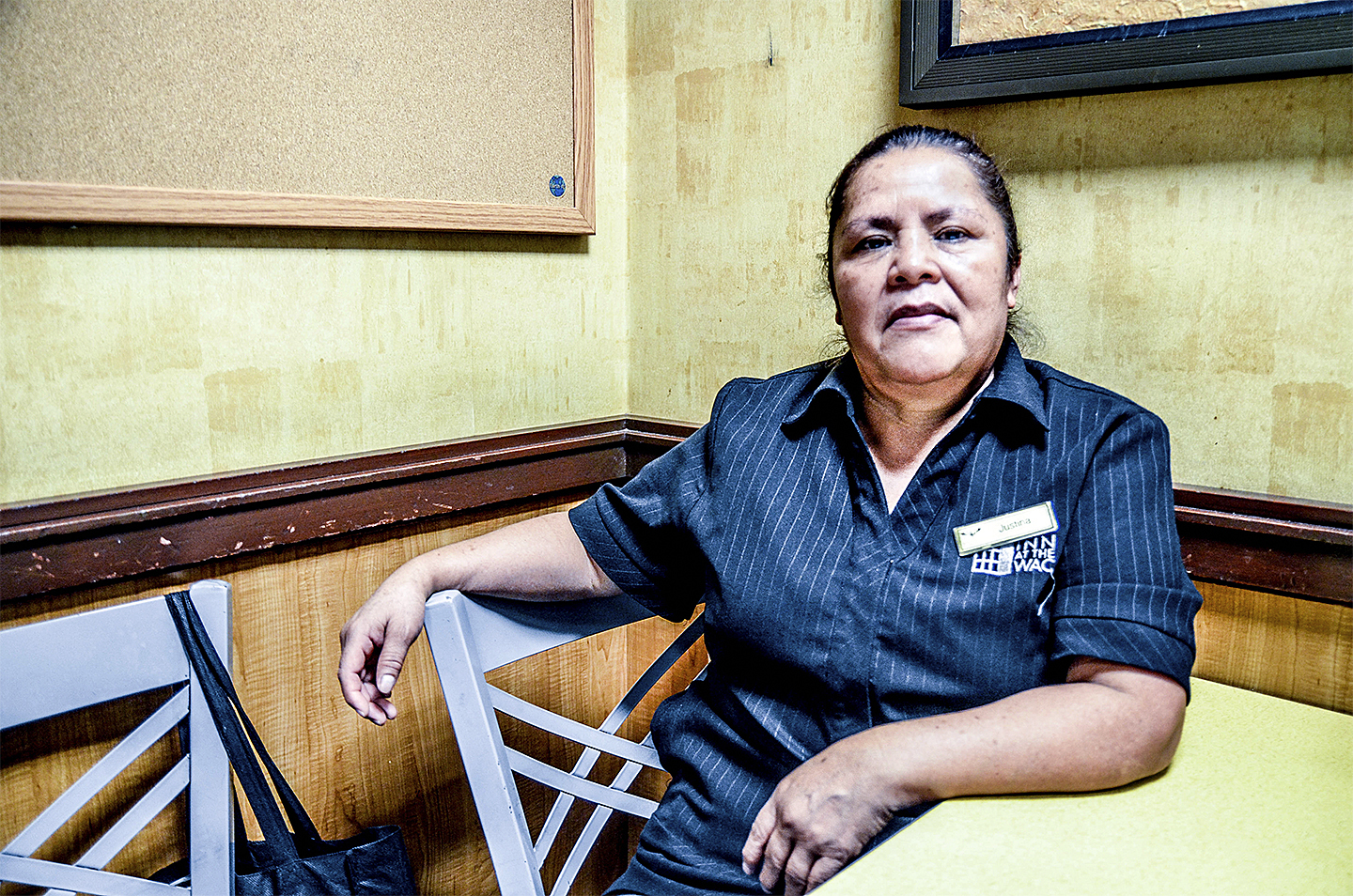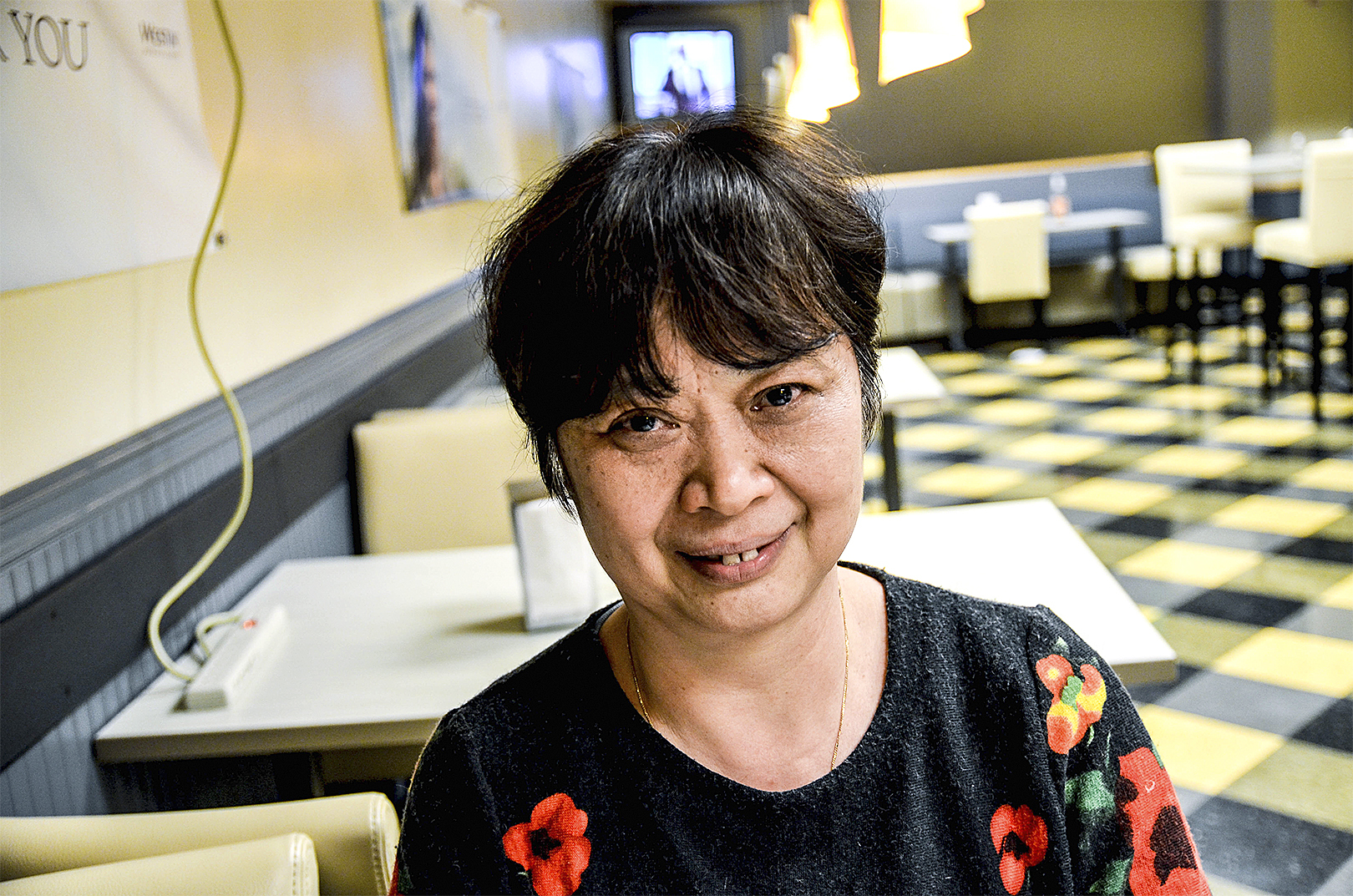Ermalyn Magtuba moved to Seattle from the Philippines 17 years ago. She has two kids, and to help support them, she works two jobs—roughly 74 hours a week—in room and food service at two different downtown Seattle hotels. “To survive and have a good life” in this city, “you have to have two jobs,” she says during a late-morning interview with Seattle Weekly in early June. She lives in Everett now. “I have two boys. I won’t see them until tomorrow afternoon. I’ll work until midnight, come home to Everett to take a shower, then leave Everett at 4 a.m. to go to my other job.”
It’s exhausting, but necessary, she says, in a region that’s getting more expensive by the day. So if hotel guests are “being crazy,” inappropriate, or rude, as long as they “don’t beat me up, you know what I mean, I just take it, whatever they say. I’m used to it.”
Magtuba is small—just 4´11˝. So when she shows up at a hotel room carrying a room-service tray and the men inside come to the door stark naked, or in loose boxers with the crotch wide open, or in a skimpy towel that just happens to fall off, as they often do, “I look up and the only thing I see is the … you know … in-the-middle stuff.”
Then they invite her into their rooms. It’s incredibly common, she says.
Sometimes she backs away and says no; but it’s her job, for instance, to open a bottle of a wine for a guest in his room. And although she has worked in hotels for 16 years and has come to expect this kind of behavior, it’s not always easy to shake off. She’s been made to feel embarrassed, uncomfortable, and degraded countless times. She’s been called names and racial slurs. She’s been verbally and sexually harassed. Guests proposition her and her co-workers in private spaces, in the common areas; they ask where to find prostitutes, where to find condoms. “It’s like, why are you asking me? I don’t have any in my pocket. It’s really disgusting.”
Once, Magtuba says, a co-worker arrived at a room where “the guest played a porno in her face, while she was delivering the food. And then he masturbated in front of her. The hotel didn’t do anything. She told human resources; she told everybody.”
Magtuba says another of her co-workers was grabbed, assaulted, and nearly raped in a guest’s room, prompting hotel management to temporarily provide housekeepers and room servers with walkie-talkies to call down to security in case of emergency. But new management came in and did away with the radios; now, each room server and housekeeper must use her own cell phone. Magtuba also relies on the wine opener. “I have that,” she says, “so I can protect myself.”
Unite Here Local 8, the regional chapter of a national union that represents about 5,000 hospitality workers across Washington and Oregon—including Magtuba—thinks there should be a whole lot more than a corkscrew between her and sexual assault. The group recently launched a signature campaign for Initiative 124, a citywide ballot measure that would require strict protections against harassment and assault of hotel workers and would, if passed, ensure that some of the protections the union has already negotiated for its members extend to all Seattle hotels, including better access to health care, workload limitations, and job security. It’s the latest battle in the ongoing war for labor rights in Seattle—the birthplace of many recent worker-protection firsts, including the $15 minimum wage and the right for Uber and other taxi drivers to unionize.
It’s not that hotel management refuses to hear about harassment, or doesn’t at least try to respond, Magtuba says. It’s more that the ethos of the hospitality industry—particularly in high-end, luxury hotels—is to side with the paying guest. The imbalance of power between server and served comes into focus when employers kowtow to the oldest rule in the book: The customer is always right. “Any guest can say anything to you without you telling them [anything] back,” Magtuba insists. “Even if it’s really hurting” her feelings—making her feel cheap, disrespected, or scared. A hotel is more concerned with reviews on TripAdvisor, she claims, than the discomfort of its employees.
“That’s the job you do,” she adds in a hoarse voice. For Magtuba and her colleagues, jeopardizing a steady job is out of the question. “Sometimes we laugh over it. We can’t say anything. We laugh … and we do the next day again.”
Hotel housekeepers and room servers have some of the lowest-paid and highest-risk jobs of any across the country. In Seattle, many earn at or just above minimum wage, putting their positions near the bottom of all available jobs in the city that don’t require a college degree. In 2010, the median income of hotel housekeepers in King County was just under $22,000 a year. Today, at the union-negotiated high end, housekeepers can earn up to $35,000. After factoring in taxes, a reasonable rent-to-income ratio suggests little more than $800 a month to spend on housing.
According to the U.S. Bureau of Labor Statistics, nearly 90 percent of hotel housekeepers across the country are women. In Seattle, that number is just over 80 percent. The vast majority are immigrants of color who have arrived in the United States with limited English and limited prospects, so they usually take the job they can get, then keep the job they have. And in part because the job requires them to conduct professional interactions in inherently private, intimate spaces, hotel workers routinely experience sexual harassment—or worse. The industry is full of stories exactly like Magtuba’s. While sexual assault and harassment are severely underreported in every context, the scant data that does exist for hotel workers is chilling: In one 2008 study, 82 percent of hotel employees reported having been harassed or abused by guests; in another, nearly all had experienced some kind of inappropriate advance.
And housekeeping, something Magtuba did on-call for about seven months before she switched to a steadier gig serving food, is much more difficult than it sounds. The workload is intense; women lift dozens of 100-plus-pound mattresses, push heavy carts, and get down on their hands and knees to scrub for hours on end, day in and day out. It’s grueling, but also brutally repetitive, leading to high rates of occupational injury industry-wide.
A 2010 study published in the American Journal of Industrial Medicine, for instance, found that hotel employees are 40 percent more likely to be injured on the job than any other service-sector workers, and of all hotel employees, housekeepers have the highest rates of injury. In a survey of Las Vegas hotel housekeepers, 75 percent reported experiencing work-related pain in the previous year. In another survey of hundreds of hotel housekeepers in the U.S. and Canada, 91 percent of respondents reported work-related pain. And according to the latest available data from the Bureau of Labor Statistics, hotel and motel employees experience a significantly higher rate of injury on the job than do coal miners. These include back, shoulder, and knee injuries and repetitive-stress disorders such as tendonitis and carpal tunnel syndrome.
Jian Hua Wu, who goes by Jenny, moved to Seattle from China 11 years ago, where she worked in sales, she says. She sold medical supplies to big hospitals, so she’d travel for work and stay in hotels. But until she came to the United States and got the job she could get—housekeeper, also known as “room attendant”— she didn’t know how difficult it actually is. “Before the training, the manager use a lot of time to tell me how hard this job,” she says, emphatically. “But I don’t understand. I don’t believe. I heard, they say, ‘Oh, it’s a hard job,’ but I don’t know how hard. You not do the room attendant, you don’t know.” She says most of her co-workers are in some kind of pain. “I hear everybody say, ‘Oh my goodness, today is terrible.’ So tired, you know? Even if you not tell someone, still your body pain.”
Thoy Kim, a Cambodian refugee who came to the U.S. in 1980 after living in refugee camps in Thailand and the Philippines for nearly six years, has managed to stay in her job as a room attendant in a downtown Seattle hotel for more than three decades. “Yeah, I have pain,” she says. “I have pain here,” pointing to her shoulder, “pain there,” her knee. “I get a little bit pain everywhere.” And then, half-joking: “Maybe next year I cannot move!” We meet at a McDonald’s downtown, and at the end of the conversation she struggles to stand up. Asked what part of the job she finds most difficult, she simply repeats, again and again, “The whole thing. The whole thing. Very, very hard, housekeeping.”
Yet hotel workers are among the least likely of all full-time employees to have employer-provided health insurance. According to a Washington Employee Benefits Survey Report from 2013, 61.4 percent of all full-time food services and accommodation employees across the state work for a company that offers them health care—the lowest percentage of all job categories. A 2012 Puget Sound Sage report on Seattle’s hotel industry points out that nationwide, three in five hotel workers don’t have that option.
Things have improved since the advent of the Affordable Care Act, aka Obamacare, but “there’s still a huge gap, because employers can offer a pretty low-quality health insurance product,” says Howard Greenwich, senior policy advisor at Puget Sound Sage and co-author of the report. Copays can be so high that workers “just can’t afford it … [so] they don’t take it.”
Like a lot of service-sector jobs, the people who make up the hotel workforce “are invisible,” he adds. “They’re behind the scenes. They’re most likely workers of color. They’re immigrants. In the case of housekeepers, they’re mostly women. They’re not strong English speakers. These are folks that are already marginalized in society or the economy. They are, frankly, easier to exploit.”
In the 1950s and ’60s, hotel workers weren’t as easy to exploit. Almost every one of them, in every major city in the U.S., belonged to a union. But that was also when most hotels were family-owned, says Greenwich; now they are almost exclusively nationally or internationally owned chains. Many came in and bought out smaller hotels, nullifying previously held union contracts. That practice “has been very effective,” he says, “in getting rid of unions.”
Today about 16 percent of Seattle hotel workers are members of Unite Here Local 8, according to staffer Abby Lawlor, who’s heading the campaign for Initiative 124. The effort, therefore, is designed to protect workers whether or not they’re union members—and to “strengthen workers’ ability to have a safe and harassment-free” environment, she says, “even in union hotels.”
Lawlor notes that what’s routine for housekeepers and room servers “is not something that’s routine for other women in the workforce. Right? To have to encounter naked men. To be in the room with someone and to feel that discomfort. I think the issue is twofold. One, harassment is taking place. Two, women often feel a lot of fear and intimidation and shame in going to their managers.”
To help counteract that, the initiative would require that all hotels provide “panic buttons” for each employee providing in-room services. (This tool now exists in almost all the major hotels in New York City, part of a union contract negotiated in 2012 following the alleged rape of a housekeeper at the hands of former International Monetary Fund chief Dominique Strauss-Kahn.) It would also require that hotels keep a record of all guests who’ve been accused of sexual harassment, let workers know when a guest on the list is staying at the hotel, let guests know of employees’ rights by posting a sign on the door of each room, and ban guests for three years if the assault or harassment is supported by an official statement made by the victim “under penalty of perjury”—a provocative stance at a time when most sexual harassment and assault cases end up as a battle of he said/she said and the victim’s statement on its own holds almost no legal sway at all.
But “if the guest harasses the employees, they should have a law that they have to ban the person,” argues Magtuba, who’s heartily behind the initiative. “They learn their lesson that they cannot treat people like that.”
On its face, I-124 is a measure that protects women. (Its website, for instance, is seattleprotectswomen.org). “It’s a woman-centered piece of policy, which is unusual,” says Nicole Grant, executive secretary-treasurer of the M. L. King County Labor Council, AFL-CIO, which endorsed the initiative and has been helping Unite Here collect signatures. “Seattle is noteworthy for its callousness toward women in the workplace.”
The numbers support that statement. Seattle does have one of the highest gender pay gaps in the country, and, as Grant points out, its money-making industries (tech, programming, aerospace) are male-dominated. “It’s exciting to see something that’s putting women’s rights and women’s safety front and center.”
But there’s a whole lot more to I-124 than addressing sexual harassment. The proposal folds in many other protections, such as requiring large hotels to provide an extra stipend to low-income employees to help cover the cost of health-care premiums and addressing “disruptions in the hotel industry” by requiring new hotel owners to offer jobs to the workers under prior management.
It would also, controversially, limit the area that hotel housekeepers are required to clean to 5,000 square feet per shift. Unite Here has already negotiated a cap of 15 rooms per eight-hour shift for the majority of its members, which translates to roughly 5,000 square feet at the Westin, one of Seattle’s unionized hotels. If they clean more than that, they’re paid overtime. The initiative would extend that protection to all housekeepers in Seattle; the idea is to reduce the risk of injury. “People would readily acknowledge that construction workers should have hard hats and coal miners should have protective equipment and standards,” argues Lawlor. “We want to call attention to the fact that this work is just as physically strenuous and there are lots of physical risks associated with it.”
Some members of the hotel industry, however, find the initiative overwrought and illogical. “Specific square footage rules don’t make sense,” says Jenne Neptune, general manager at the Alexis Hotel and president of the Seattle Hotel Association. “Typically, a hotel will determine the amount of rooms cleaned by the number of beds and size of the bathroom, as those are the most difficult areas for a room attendant to clean.” If all a room needs is the bed made and a fresh towel, for instance, “the task is typically the same for a room of 300 square feet and 1,000 square feet. Scheduling based on square footage is not a logical way to assign workloads in our industry.”
But even what’s been negotiated at a few union hotels—the 15-room limit—is plenty difficult, workers say. In a single shift, that means housekeepers get roughly 30 minutes per room, which can be an impossible rate to maintain.
“It depends on the manager” whether or not that’s a problem, says Wu. Where she works now, if a room attendant can’t finish all 15 rooms, she can just call down to management and say so. “If I cannot finish … of course, I’m human, I cannot finish … I just let the manager know. But some manager not care. Like, ‘You go to finish the room,’ you know?”
Anecdotes from workers at non-union hotels put the required number of rooms per shift anywhere between 18 and 30. In one story I heard, when a housekeeper was unable to finish cleaning the expected number of rooms in the expected amount of time, she was forced to clock out and then finish the work, unpaid. This seems unlikely (not to mention illegal), but employers confirm that there isn’t really an industry standard on this.
At the Sheraton, for instance, “housekeepers get paid a certain number of rooms per shift, and then they are allowed—and they have asked for—more rooms per shift, which they get paid for,” says Howard S. Wright III, founder and chair of Seattle Hospitality Group and investor in many large area hotels, including the Sheraton. He was also co-chair on the committee that developed Seattle’s $15 minimum wage ordinance. (“One of my core values is that people ought to be able to earn enough money to live,” he says.) “In other words, they’re not paid for a standard shift, they’re paid for the rooms they do.”
Wright, who does not support I-124, believes its regulations would “prevent people from being able to ask for more work. If you put a limitation on the number of square feet, then we are denying—at their request—to be paid more and work more.”
But labor advocates don’t believe that’s a fair system, either.
“That sounds like something the Sakuma Brothers would say about berry pickers,” argues Grant, referring to the case of Sakuma Brothers Farms in Burlington, Wash., where workers earn wages based on how many pounds of fruit they pick, not how many hours they work; the farm settled a wage-theft lawsuit, brought by its workers, for $850,000 in 2014. (Just last week, dozens of workers walked out again.) “From stopping children from picking as many berries as their tiny little hands can pick,” she intones, sarcastically, “don’t you understand that they’re making it so that they can’t make more money?”
The level of risk these women take on, she adds, doesn’t come close to matching their level of compensation. “I’m a union electrician,” she says. “I took a lot of risks with my safety in order to be successful as an electrician. People know the job is dangerous. But I wasn’t making minimum wage, you know? I was making enough money to buy a house, to take my kids to daycare. I could afford to save. I could afford to travel. If you’re gonna be facing certain injury, if statistically you’re definitely gonna throw your back out, you’re definitely gonna develop carpal tunnel syndrome, that just doesn’t jive with minimum wage and no health insurance.”
Industry representatives are quick to point out that the workers’ lot is not as bad as it sounds. At the Sheraton, for example, “all eligible associates have access to health care” in accordance with the Affordable Care Act, says general manager Keri Robinson. “In addition to medical insurance, we offer an array of wellness initiatives, including incentives for leading a healthy lifestyle and injury prevention.” The Sheraton already has panic buttons, too, she says, and “we address reported harassment, of any kind, swiftly, and are committed to following all local, state, and federal laws.”
Same goes for a number of other large hotels in the city, according to Neptune. Many offer housekeepers some kind of panic button or alarm, and all have “a property-specific policy used to report any instances of inappropriate behavior by a guest” and make sure that “the Seattle Police Department is involved in situations that involve any type of illegal behavior.”
Wright says he believes that Unite Here “is looking for ways to be relevant and sustainable,” nothing more. To him, I-124 proponents are saying: “ ‘Let’s put signals at crosswalks for fear of a pedestrian accident.’ But there are already signals at crosswalks! What seems like a good idea might already have been addressed.”
Even if it has been, in some cases, that’s not enough, says Grant. “I’m glad there’s a few hotels where women are protected from sexual assault on the job; I’m glad that there’s a few hotels where women get adequate health care. But I think it should be every hotel that is required to protect housekeepers and provide adequate health care for their families.”
This kind of effort is not unique to Seattle. An almost identical fight to protect hotel housekeepers from sexual harassment and injury has been happening over the past year in Long Beach, Calif. (it and many similar actions across the country are affiliated with Unite Here). California State Assemblywoman Lorena Gonzalez (D-San Diego) is also sponsoring a bill that would establish extra sexual-harassment protections for janitors in California following the release of “Rape on the Night Shift,” a 2015 PBS Frontline investigation that documented high rates of sexual harassment and assault among female janitorial workers.
For Magtuba, Kim, and Wu, it’s also about respect. If such protections were city law, and not bestowed according to the whims of hotel management, then workers might feel empowered to come forward with complaints or fears. “People will respect who works at the hotel,” says Magtuba. “Not like treating us as a slave, or something.”
A law like this “is helping the room attendant,” adds Wu. Then she pauses, corrects herself. “Not the room attendant. The human, you know?”











